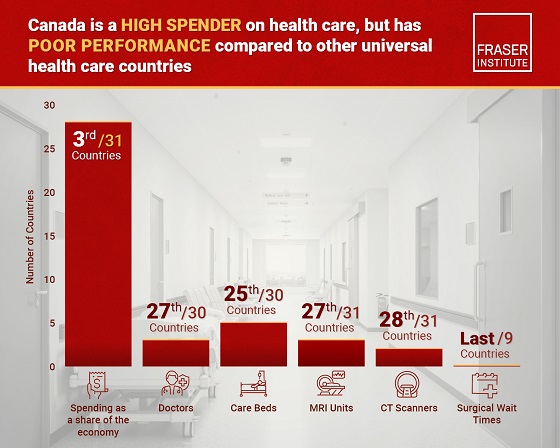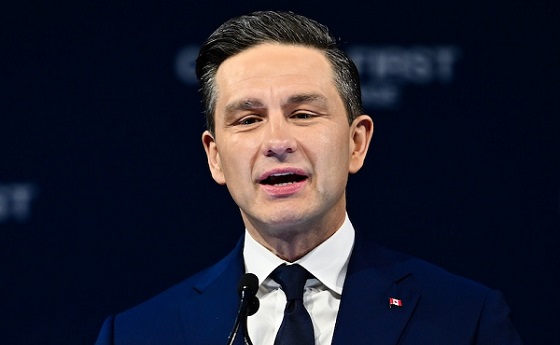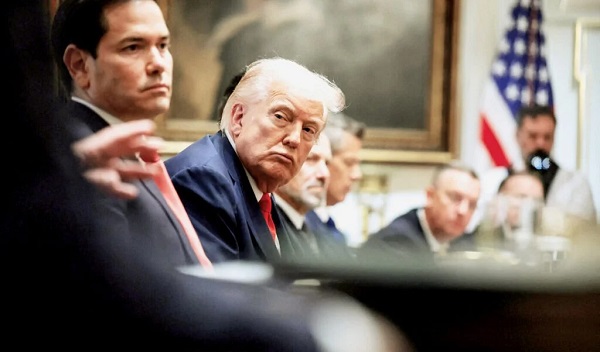Uncategorized
Ukraine calls up reservists amid tensions with Russia

KYIV, Ukraine — Ukraine’s president on Monday announced a partial call-up of reservists for training amid tensions with Russia, saying the country needs to beef up its
The Kremlin dismissed the Ukrainian leader’s statement as an “absurd” attempt to inflame tensions.
Relations between the two
Ukrainian President Petro Poroshenko responded by introducing martial law for 30 days in much of Ukraine. For the duration of martial law, Ukrainian authorities barred entry to all Russian males aged 16 to 60 in a move the Ukrainian leader said was needed to prevent Russia from further destabilizing the country.
Poroshenko said Monday that some reservists will be summoned for training as part of martial law. He also said that some military units will be redeployed to strengthen the nation’s
“Ukraine is taking its own steps in response to the threat of a large-scale Russian invasion,” the Ukrainian leader said.
Over the weekend, Poroshenko said that Russia has deployed a large number of troops along its border with Ukraine and alleged that the Kremlin intends to push inland into Ukraine. Ukraine also accused Russia of blockading its ports on the Sea of Azov.
Russian President Vladimir Putin’s spokesman, Dmitry Peskov, dismissed Poroshenko’s claims as an “absurd attempt to foment tensions.”
“The accusations against Russia have no basis whatsoever,” he said.
Peskov also rejected
The separatist conflict in eastern regions forming Ukraine’s industrial heartland has taken a toll on the national economy, reducing the cargo flow through the Ukrainian ports of Mariupol and Berdyansk on the Sea of Azov. The naval incident further stoked tensions.
Vitaliy Sinhur, a dock worker in Berdyansk, said the movement of ships has significantly ebbed.
Amid the tensions, the Russian military said its forces in Crimea were conducting drills involving Bal and Bastion long-range anti-ship missile systems.
Over the weekend, Poroshenko urged Germany and other Western allies to boost their naval presence in the Black Sea to help deter Russia from further aggression.
Ukraine’s deputy
The U.S. and its NATO allies have strongly urged Russia to free the Ukrainian vessels and the crews.
“There is no justification for this use of force,” NATO Secretary-General Jens Stoltenberg told reporters Monday. “Russia must release the Ukrainian sailors and ships. It must also allow freedom of navigation and unhindered access to Ukrainian ports in the Sea of Azov.”
NATO foreign ministers are set to discuss the incident later this week.
Asked what action NATO could take, Stoltenberg said: “We provide strong political but also strong practical support to Ukraine.”
He added that NATO allies have helped modernize Ukraine’s armed forces, have boosted their presence in the Black Sea over the last year, with more ships deployed in the region and more air policing.
In the Nov. 25 incident, three Ukrainian naval vessels were heading from the Black Sea into the Sea of Azov when they were blocked by the Russian coast guard near the Kerch Strait between Russia’s mainland and Crimea. After many tense hours of
The Ukrainian seamen have been put in custody for two months pending Russia’s investigation into the clash.
Ukraine and Russia have traded blame for the naval incident that further escalated the tug-of-war that began in 2014 when Russian annexed Crimea and backed separatist rebels in eastern Ukraine.
Ukraine says that its ships were operating in line with a 2003 treaty with Russia envisaging free navigation for vessels of both countries in the Sea of Azov and the Kerch Strait.
Russia is adamant that the Ukrainian ships had entered its waters without permission.
Later this week, the Ukrainian parliament is expected to mull a presidential bill blocking the extension of a friendship treaty after it expires next April, a long-anticipated symbolic move.
Poroshenko has said he tried to arrange a phone call with Putin to discuss the standoff but faced the Kremlin’s refusal.
Peskov said Monday that “no such conversation is planned.”
—-
Vladimir Isachenkov reported from Moscow. Lorne Cook in Brussels contributed to this report.
Yuras Karmanau And Vladimir Isachenkov, The Associated Press
Uncategorized
New report warns WHO health rules erode Canada’s democracy and Charter rights

The Justice Centre for Constitutional Freedoms has released a new report titled Canada’s Surrender of Sovereignty: New WHO health regulations undermine Canadian democracy and Charter freedoms. Authored by Nigel Hannaford, a veteran journalist and researcher, the report warns that Canada’s acceptance of the World Health Organization’s (WHO) revised International Health Regulations (IHR) represents a serious erosion of national independence and democratic accountability.
The IHR amendments, which took effect on September 19, 2025, authorize the WHO Director-General to declare global “health emergencies” that could require Canada to follow directives from bureaucrats in Geneva, bypassing the House of Commons and the will of Canadian voters.
The WHO regards these regulations as “binding,” despite having no ability or legal authority to impose such regulations. Even so, Canada is opting to accept the regulations as binding.
By accepting the WHO’s revised IHR, the report explains, Canada has relinquished its own control over future health crises and instead has agreed to let the WHO determine when a “pandemic emergency” exists and what Canada must do to respond to it, after which Canada must report back to the WHO.
In fact, under these International Health Regulations, the WHO could demand countries like Canada impose stringent freedom-violating health policies, such as lockdowns, vaccine mandates, or travel restrictions without debate, evidence review, or public accountability, the report explains.
Once the WHO declares a “Pandemic Emergency,” member states are obligated to implement such emergency measures “without delay” for a minimum of three months.
Importantly, following these WHO directives would undermine government accountability as politicians may hide behind international “commitments” to justify their actions as “simply following international rules,” the report warns.
Canada should instead withdraw from the revised IHR, following the example of countries like Germany, Austria, Italy, Czech Republic, and the United States. The report recommends continued international cooperation without surrendering control over domestic health policies.
Constitutional lawyer Allison Pejovic said, “[b]y treating WHO edicts as binding, the federal government has effectively placed Canadian sovereignty on loan to an unelected international body.”
“Such directives, if enforced, would likely violate Canadians’ Charter rights and freedoms,” she added.
Mr. Hannaford agreed, saying, “Canada’s health policies must be made in Canada. No free and democratic nation should outsource its emergency powers to unelected bureaucrats in Geneva.”
The Justice Centre urges Canadians to contact their Members of Parliament and demand they support withdrawing from the revised IHR to restore Canadian sovereignty and reject blind compliance with WHO directives.
Uncategorized
CNN’s Shock Climate Polling Data Reinforces Trump’s Energy Agenda


From the Daily Caller News Foundation
As the Trump administration and Republican-controlled Congress move aggressively to roll back the climate alarm-driven energy policies of the Biden presidency, proponents of climate change theory have ramped up their scare tactics in hopes of shifting public opinion in their favor.
But CNN’s energetic polling analyst, the irrepressible Harry Enten, says those tactics aren’t working. Indeed, Enten points out the climate alarm messaging which has permeated every nook and cranny of American society for at least 25 years now has failed to move the public opinion needle even a smidgen since 2000.
Appearing on the cable channel’s “CNN News Central” program with host John Berman Thursday, Enten cited polling data showing that just 40% of U.S. citizens are “afraid” of climate change. That is the same percentage who gave a similar answer in 2000.
Dear Readers:
As a nonprofit, we are dependent on the generosity of our readers.
Please consider making a small donation of any amount here.
Thank you!
Enten’s own report is an example of this fealty. Saying the findings “kind of boggles the mind,” Enten emphasized the fact that, despite all the media hysteria that takes place in the wake of any weather disaster or wildfire, an even lower percentage of Americans are concerned such events might impact them personally.
“In 2006, it was 38%,” Enten says of the percentage who are even “sometimes worried” about being hit by a natural disaster, and adds, “Look at where we are now in 2025. It’s 32%, 38% to 32%. The number’s actually gone down.”
In terms of all adults who worry that a major disaster might hit their own hometown, Enten notes that just 17% admit to such a concern. Even among Democrats, whose party has been the major proponent of climate alarm theory in the U.S., the percentage is a paltry 27%.
While Enten and Berman both appear to be shocked by these findings, they really aren’t surprising. Enten himself notes that climate concerns have never been a driving issue in electoral politics in his conclusion, when Berman points out, “People might think it’s an issue, but clearly not a driving issue when people go to the polls.”
“That’s exactly right,” Enten says, adding, “They may worry about in the abstract, but when it comes to their own lives, they don’t worry.”
This reality of public opinion is a major reason why President Donald Trump and his key cabinet officials have felt free to mount their aggressive push to end any remaining notion that a government-subsidized ‘energy transition’ from oil, gas, and coal to renewables and electric vehicles is happening in the U.S. It is also a big reason why congressional Republicans included language in the One Big Beautiful Bill Act to phase out subsidies for those alternative energy technologies.
It is key to understand that the administration’s reprioritization of energy and climate policies goes well beyond just rolling back the Biden policies. EPA Administrator Lee Zeldin is working on plans to revoke the 2010 endangerment finding related to greenhouse gases which served as the foundation for most of the Obama climate agenda as well.
If that plan can survive the inevitable court challenges, then Trump’s ambitions will only accelerate. Last year’s elimination of the Chevron Deference by the Supreme Court increases the chances of that happening. Ultimately, by the end of 2028, it will be almost as if the Obama and Biden presidencies never happened.
The reality here is that, with such a low percentage of voters expressing concerns about any of this, Trump and congressional Republicans will pay little or no political price for moving in this direction. Thus, unless the polls change radically, the policy direction will remain the same.
David Blackmon is an energy writer and consultant based in Texas. He spent 40 years in the oil and gas business, where he specialized in public policy and communications.
-

 Business2 days ago
Business2 days agoQuebecers want feds to focus on illegal gun smuggling not gun confiscation
-

 Business2 days ago
Business2 days agoEmission regulations harm Canadians in exchange for no environmental benefit
-

 Courageous Discourse2 days ago
Courageous Discourse2 days agoNo Exit Wound – EITHER there was a very public “miracle” OR Charlie Kirk’s murder is not as it appears
-

 Business2 days ago
Business2 days agoCanada has fewer doctors, hospital beds, MRI machines—and longer wait times—than most other countries with universal health care
-

 Carbon Tax16 hours ago
Carbon Tax16 hours agoBack Door Carbon Tax: Goal Of Climate Lawfare Movement To Drive Up Price Of Energy
-

 Digital ID16 hours ago
Digital ID16 hours agoThousands protest UK government’s plans to introduce mandatory digital IDs
-

 Automotive2 days ago
Automotive2 days agoParliament Forces Liberals to Release Stellantis Contracts After $15-Billion Gamble Blows Up In Taxpayer Faces
-

 Alberta2 days ago
Alberta2 days agoPetition threatens independent school funding in Alberta






